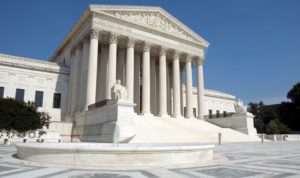
President Biden nominates Judge Ketanji Brown Jackson to the Supreme Court, delivers a State of the Union address, and more . . .
IN THE NEWS
- President Joseph R. Biden nominated Judge Ketanji Brown Jackson as a Justice of the U.S. Supreme Court to replace the retiring Justice Stephen Breyer. Judge Jackson’s confirmation hearing will reportedly begin on March 21. In his State of the Union address, President Biden praised Judge Jackson as one of the “top legal minds” and a “consensus builder.” If confirmed, Judge Jackson will serve as the first Black woman and past public defender on the Supreme Court. Law professor at the University of Wisconsin-Madison Law School, Steph Tai, praised Judge Jackson for sticking “to the requirements of the Administrative Procedure Act,” which Tai noted “allows a lot of deference to agencies.”
- President Biden gave his State of the Union address, in which he addressed Russia’s war on Ukraine, energy prices, and the COVID-19 pandemic, among other issues of national importance. President Biden stated that in addition to economic sanctions that the United States had previously imposed on Russia, the United States would also prohibit Russian planes from entering U.S. air space. President Biden also announced plans to cap prescription drug prices, create energy efficient businesses and homes, and levy a 15 percent minimum corporate tax rate. In the Republican rebuttal, Iowa governor Kim Reynolds criticized the administration’s spending policies, citing inflation.
- The Supreme Court heard oral arguments in West Virginia v. EPA, a case that may determine how much regulatory power the U.S. Environmental Protection Agency has to decarbonize the United States under the Clean Air Act. Many of the justices focused on the scope of the “major questions doctrine,” which limits the authority of agencies to create rules about “exceptional political and economic” issues in cases where Congress has not provided clear authorization to agencies to address such issues. Jonathan H. Adler, law professor at Case Western Reserve University School of Law, reportedly stated that this case “could well become one of the most significant environmental law cases of all time.”
- A court blocked Texas Governor Greg Abbott’s order directing the Texas Department of Family and Protective Services to investigate whether parents commit child abuse by allowing their transgender children to receive gender affirming care. The court found that two parents who brought suit against Governor Abbott would “suffer irreparable injury” if the order remained in place. The parents argued that Governor Abbott exceeded his constitutional and statutory authority under the Texas Administrative Procedure Act to require such investigations and asked the court to strike down the directive as unconstitutional and halt investigations of families with transgender children. A judge will allow Governor Abbott to defend the order on March 11, 2022. Counselor at Lambda Legal, Paul Castillo, stated that Governor Abbott’s directive “is unconscionable and terrifying, and cannot stand.”
- The Supreme Court agreed to review the constitutionality of the Indian Child Welfare Act, which prioritizes the placement of Native American children with relatives, other Native Americans, or a tribe. Opponents of the law argue that it violates the constitutional guarantee of equal protection because the law gives preference to Native Americans over non-Native people seeking to adopt a Native American child. The law’s opponents also argue that it forces child services officials to deprioritize the child’s best interests. Federal Indian law expert and professor at New York University Law School, Maggie Blackhawk, contended that the case could “destroy the few laws that mitigate American colonization of Native peoples.”
- The U.S. Nuclear Regulatory Commission announced a proposed rule that would change the way nuclear power plants are decommissioned, which is the process of safely shutting them down from use. The proposed rule would impose different requirements for each phase of decommissioning. In contrast, the current approach applies a single rule to all nuclear power plant operations and uses ad hoc exemptions and changes to licenses to facilitate the decommissioning process. Chairman of the commission Christopher Hanson underscored “the importance of public participation in the rulemaking process” in announcing that the commission is seeking comments on the proposed rule.
- The Subcommittee on Aquaculture, a group that coordinates among several federal agencies to facilitate aquaculture research and programs, released a draft outline of its strategic plan for aquaculture economic development. The group seeks to “create a robust, resilient, and environmentally sustainable domestic aquaculture sector” that will “maximize the effectiveness of existing federal policies and programs.” The group requested public comments on the plan’s goals.
- The U.S. Fish and Wildlife Service added the peppered chub, a small freshwater minnow, to the endangered species list under the Endangered Species Act. Only one remaining population of peppered chub exists in the United States. The agency also designated over 870 miles of river in New Mexico, Oklahoma, and Texas as “critical habitat” for the peppered chub. Michael Robinson, senior conservation advocate at the Center for Biological Diversity, a nonprofit focused on conservation, praised the agency’s action for providing “lifesaving protection” to this species “on the brink of extinction.”
WHAT WE’RE READING THIS WEEK
- In a report by the Global Commission on People-Centred Clean Energy Transitions, a group established by the International Energy Agency, the commission provided clean energy transition recommendations to governments. The commission suggested that governments should emphasize job creation in the transition and highlighted the work of countries such as Denmark and Japan that have created or retained jobs for communities negatively impacted by the transition. The commission also emphasized that countries should consider gender, equality, and social inclusion when creating energy policy to bring marginalized communities into the transition. The group concluded that countries should collaborate to provide the benefits of clean energy to developing countries to avoid worsening global inequality and inopportunity.
- In an article in the Yale Journal on Regulation, Reid B. Stevens, an economics consultant, and Jeffery Y. Zhang, senior attorney in the legal division of the Board of Governors of the Federal Reserve System, discussed issues that can arise when banks undertake commercial activities that are typically considered outside of the sphere of banking. Stevens and Zhang conducted an empirical analysis of the stockpiling of aluminum by banks following the global financial crisis. Their analysis showed that regional prices for the metal “skyrocketed” and the time it took to remove the aluminum from storage “increased from days to years.” Stevens and Zhang analyzed the legal “loophole” that enabled banks to hold this substantial amount of aluminum and concluded by proposing several recommendations that would restrict these activities, such as removing a part of the Bank Holding Company Act.
- In a recent report, the Consumer Financial Protection Bureau (CFPB) raised concerns about reporting medical debt on consumer credit reports. The CFPB noted that because medical debt is the most common type of debt reported to credit bureaus, reporting this information contributes to barriers to obtaining a loan, job, or housing. The CFPB reported that given this hardship, many consumers feel pressured to pay “invalid, unsubstantiated, or inaccurate medical bills” to avoid credit reporting of medical debt. The CFPB questioned whether medical debt is an appropriate measure of creditworthiness, and it pledged to work with credit reporting companies to ensure medical debt information is accurate and facilitate financial assistance programs for medical patients, among other things. CFPB director Rohit Chopra stated his concern that the “credit reporting system is being weaponized as a tool of coercion to get people to pay medical bills they may not even owe.”
FLASHBACK FRIDAY
- In an essay in The Regulatory Review, Kent Barnett, law professor at the University of Georgia School of Law, Christina L. Boyd, political science professor at the University of Georgia School of Public & International Affairs, and Christopher J. Walker, law professor at the Ohio State University Moritz College of Law, discussed how the addition of Justice Brett Kavanaugh to the Supreme Court may impact administrative law—specifically judicial deference to agencies’ interpretations of statutes. Barnett, Boyd, and Walker found that prior to his appointment to the Supreme Court, Justice Kavanaugh’s deference to an agency’s interpretation of a statute was “over 81 percent when the interpretation was conservative” and was “under 71 percent when the agency’s interpretation was liberal.” The authors found that Justice Kavanaugh had previously argued that judicial deference to agencies gives the executive branch too much power and that four other current Supreme Court Justices have also expressed willingness to limit deference to agencies.



